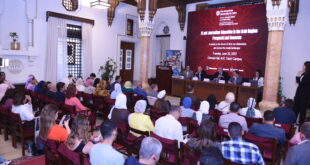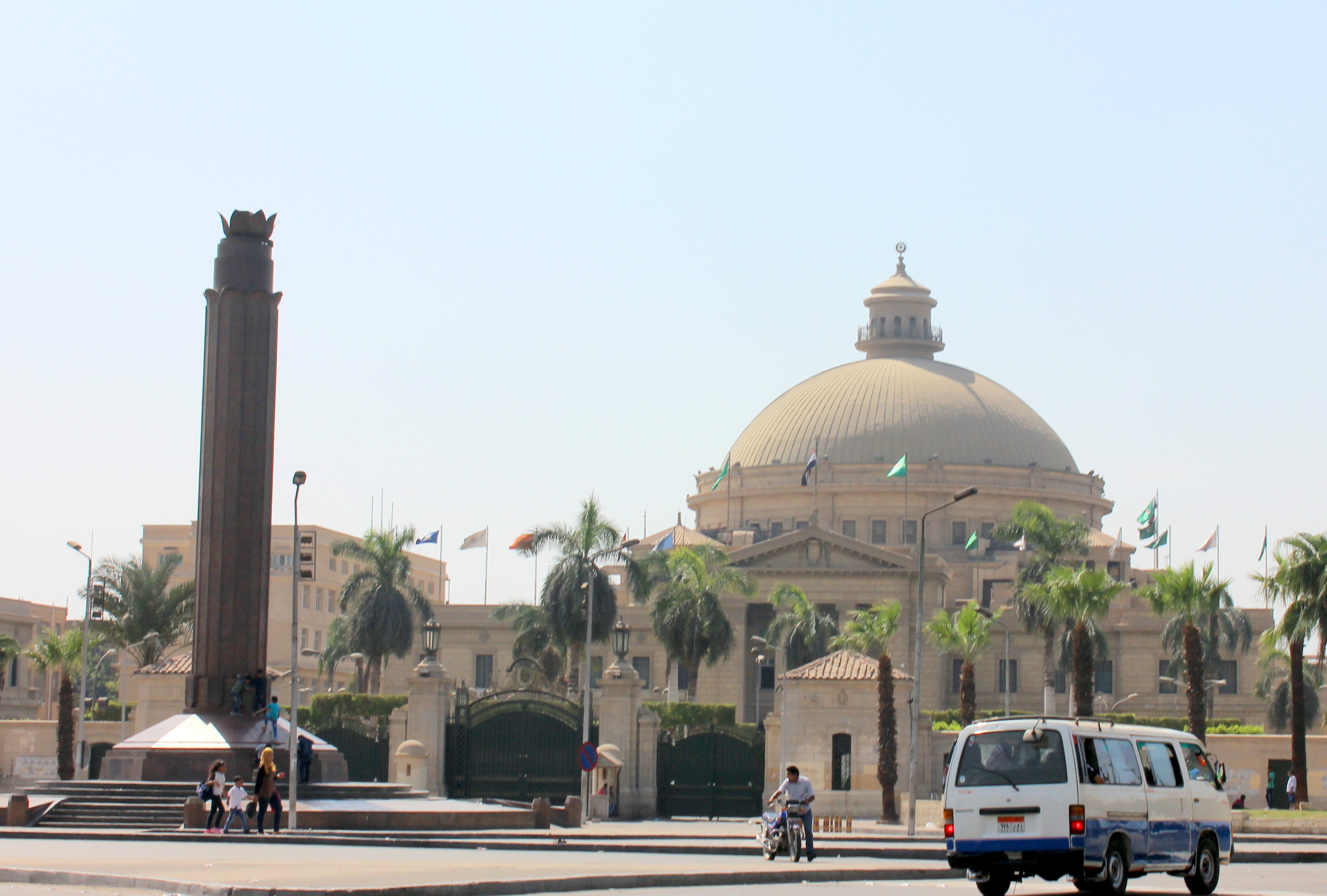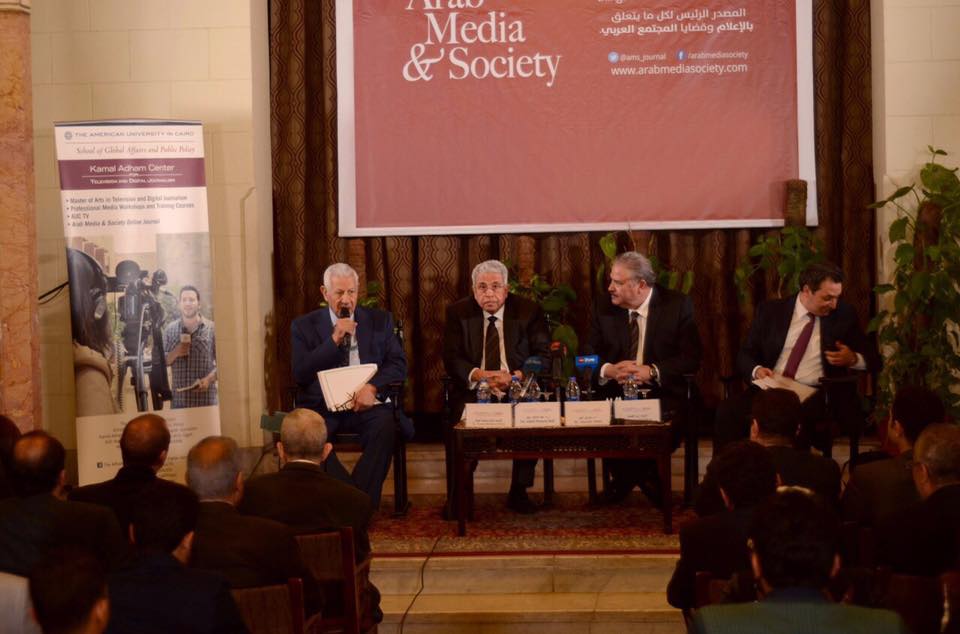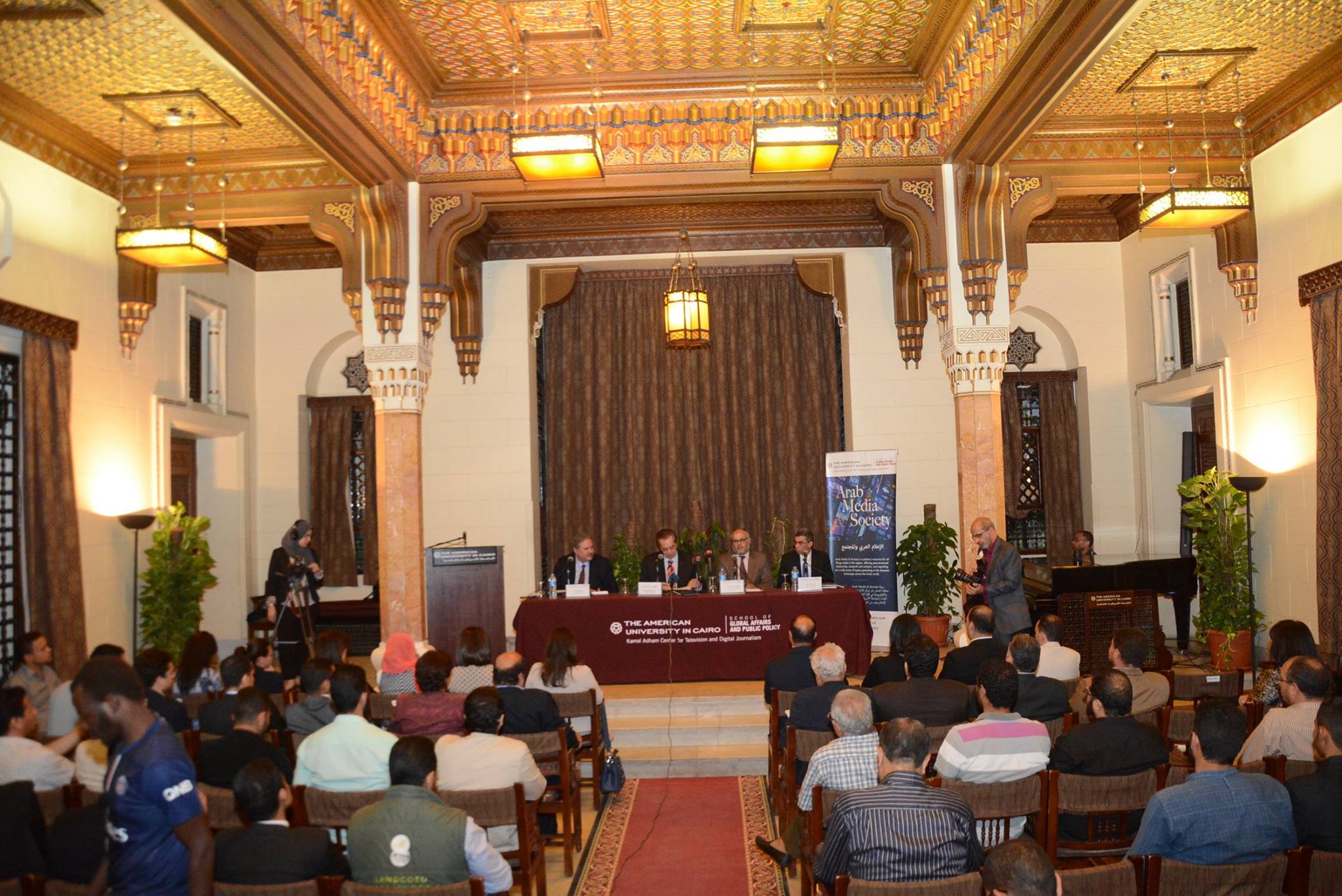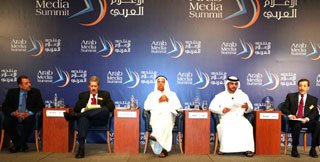
Dubai has clearly decided to make itself the media hub of the Arab World. There is the ever-expanding Dubai Media City. There is the brand-new International Media Production Zone—already dubbed "Dollywood" by the local press. And there is the annual Arab Media Summit, which brought together journalists from the regional and western press for the third time October 7-8 to discuss "War and the Media," under the rubric (somewhat optimistic as it turned out) of "A Meeting of Minds." And then, of course, and most notably, there are the notorious Arab satellite 24-hour news channels Al Jazeera, Al Arabiya, and, for as long as the war lasted at least, Abu Dhabi TV, to whom we can now add as the latest newcomer to the world of Arabic 24/7 CNBC Arabiya (see in this issue CNBC Arabiya-the Debut).
Did you say Arab satellite channels? What Arab satellite channels? Anyone squeezing through the crowded corridors and banquet halls of the Madinat Jumeira hotel or scanning the faces of panelists deliberating on such topics as "The Role of Media in Modern War" and "Iraq as a Case Study: Arab Media Coverage" could have been forgiven for thinking no such animals existed. A reader of the glossy brochure would have looked in vain for a single panelist from an Arab satellite channel, with the exception of Abu Dhabi TV's Jabir Obaid, and, arguably, Jihad El Khazen, though his close association with LBC (see An Interview with Jihad Khazen) was ignored by the organizers. Though, according to Mona Al Marri of the Dubai Press Club, Salih Al-Kallab of Al Arabiya was present as an invitee, Al Arabiya CEO Ali Al Hedeithy was out of town and neither of their names appears in the list. According to Al Marri, Al Jazeera apologized because they were busy organizing a forthcoming event of their own. But a leading Gulf media expert at the conference suggested that it was more likely that Al Jazeera was boycotting the function because of a deeply held conviction in Doha that in past years the organizers of the conference have demonstrated bias against the channel. On the paucity of satellite representation on the panels, Al Marri commented, "We preferred to have more intellectuals."
The Arab Media Awards ceremony with which the conference closed almost seemed designed to rub salt in the wound: the only satellite journalist honored was a dead one (Tariq Ayoub, killed at Al Jazeera's Baghdad office by a US shell, received a Special Award).
It was as though the war in Afghanistan, which made Al Jazeera's name famous throughout the world by reason of its exclusive coverage, had never taken place, as though the complaints of bias made against the same channels by governments and military commanders during and after the war on Iraq were (and are) directed against some phantom of their imaginations, as though Arab viewers had not abandoned their various state-run TV services by the million and tuned in, with relief, to these alternative sources of information. It was as though, in a word, the Arabsats had not revolutionized the Arab media.
Not surprisingly, while the organizers might deny reality, the participants did not: the Arab satellite channels, though absent in body, were palpably present in spirit, their names constantly invoked by the panelists, some of whom heaped praise on them while others heaped condemnation, but none of whom treated them with indifference. Abdel Bari Atwan, editor-in-chief of Al Quds Al Arabi newspaper, "thanked God every day" for the existence of the Arab satellite channels. Dr. Ahmed Al Rabae, a Kuwaiti columnist, accused them of making a bad situation worse. And Yousef Ibrahim, former correspondent for the New York Times, took the middle path, stressing the "golden opportunity" that the Arabsats had to make the Arab voice heard on the world stage, providing they got it right.
Perhaps the explanation for this rather bizarre situation should be sought in a broader mismatch between Summit and real life. The observer would have found, for instance, not only few Arabsat representatives but also few women on those panels, even though women were present in large numbers in the audiences and asked many of the best questions from the floor. In terms of national representation, there was a definite skew towards Britain at the expense of America, which was strange given that the latter came in for so much criticism. Likewise, news agencies such as Reuters and APTN, whose offices provide as much as 80 percent of all the news from the Middle East according to Martin Woollacott of The Guardian during a panel discussion, were nowhere to be seen.
A subtler but equally insidious bias seemed to be at play in the face that the organizers saw fit to present on the panels as that of the media, a face made up largely of (printed media) correspondents and writers with a sprinkling of academics—two categories of people uniquely unqualified to address the topic of the conference. Correspondents are to all appearances a more than averagely decent, intelligent, and well-intentioned group of people, on both sides. They put themselves in the line of danger and report to us what they see. Their camaraderie with one another in the field appears to know no national or religious animus (see, for example, the comments of Amr El-Kahky on his Iraq war experience). Perhaps, if they were in charge, news coverage would be more even-handed and comprehensive than it is now. The suspicions harbored by Arabs that the Western media refer to all Palestinians as "terrorists" and the belief among Westerners that the Arab media are the lackeys of the state would probably melt away. But they are not in charge. Reporters and academics do not decide which stories to cover and which to ignore, which countries to go to and which to stay away from. Editors and accountants make those decisions and there were notably few of those on the panels. Thus, when the debate raged and the accusations flew, the people who could have given the best answers were not there.
And rage and fly the debate and the accusations did. Particularly memorable contributions to the "promotion of better understanding and acceptance of each person's perspective" (the goal set by Mona Al Marri, executive manager of the Dubai Press Club) included Hisham Sharabi's confession of the "disgust" he felt at the sight of the "arrogant Western correspondent" being briefed on local conditions by a "politically incompetent native" and his characterization of Fouad Ajami as a "traitor" and a "devil." Far more temperate, even if controversial, is Prof. Sharabi's paper, published in this issue's section Arabsats-the Debate. As for the irrepressible Abd Al-Bari Atwan, he had only to drop a snide aside about Kuwait TV's coverage of the Iraq war for the hall to explode in a pandemonium of charge and counter-charge. Arab participants probably found confirmation for their every suspicion of Western media hypocrisy when Nic Robertson—CNN Senior International Correspondent and panel moderator—crisply dismissed a question regarding Christiane Amanpour's recent remarks concerning CNN's censorship of its correspondents, on the grounds that "she didn't make those remarks on CNN" (a fascinating new criterion for news-worthiness). One wonders how former CNN anchor Riz Khan, in attendance at the Summit and interviewed by TBS (see From in front of the Camera to behind the Scenes) would have dealt with the question.
Thus, while the Arab media go from strength to strength on the ground in Dubai, and while the Arab satellite channels expand and multiply, the Arab Media Summit remains seemingly in a time warp, where the correspondent is king, and the only good Arabsat is an absent one.
 Arab Media & Society The Arab Media Hub
Arab Media & Society The Arab Media Hub
